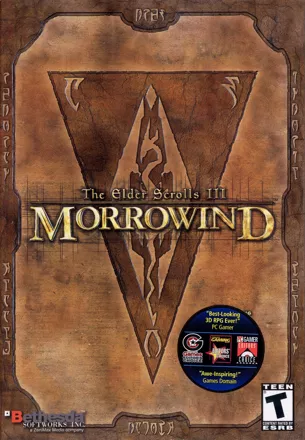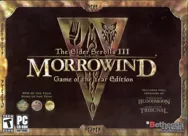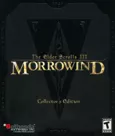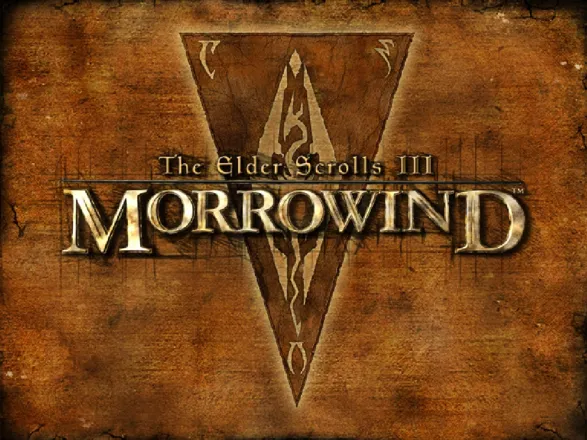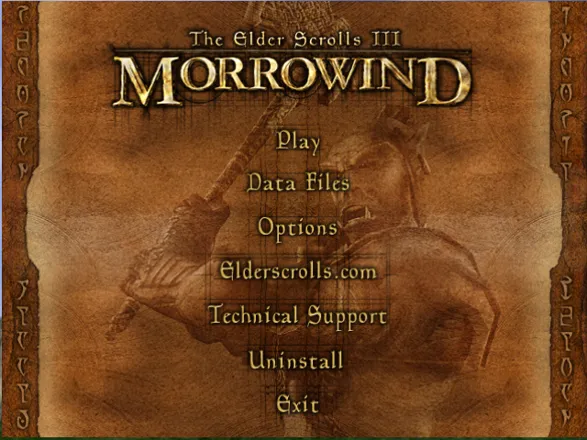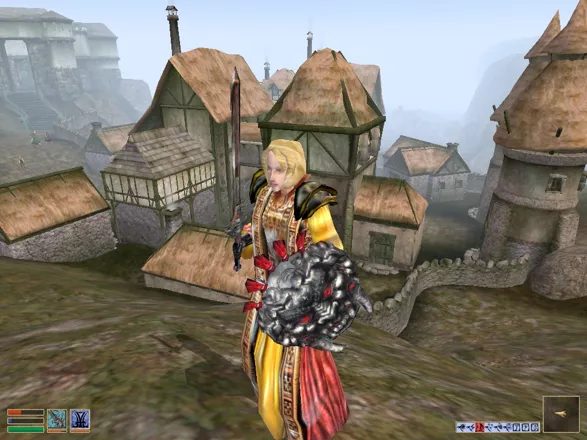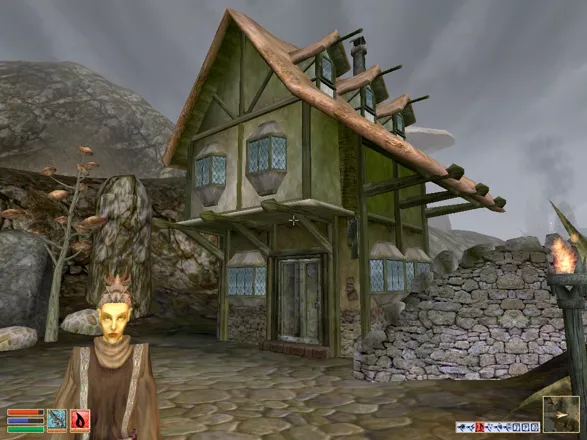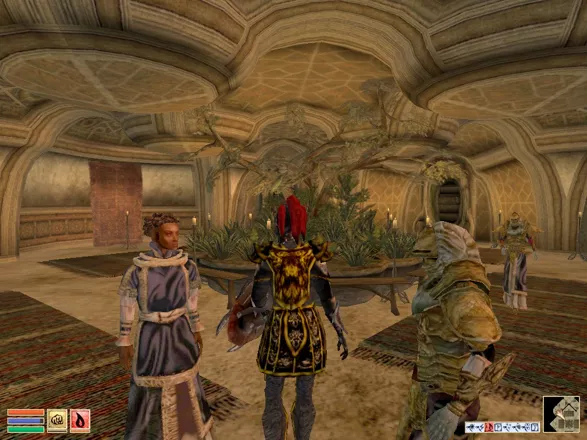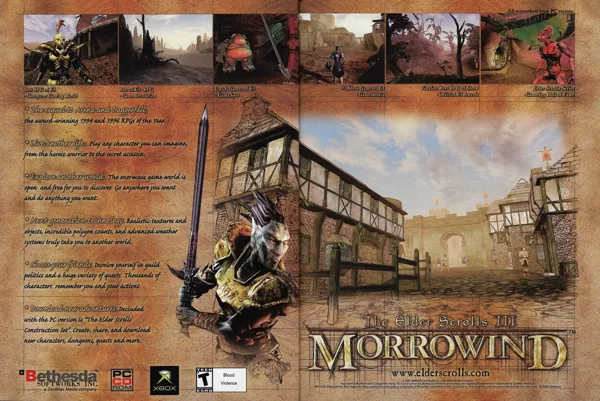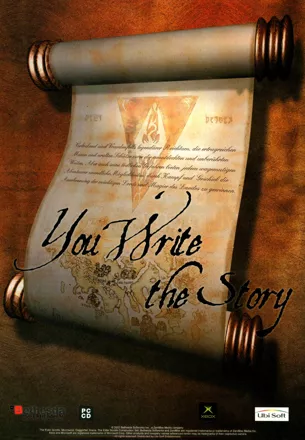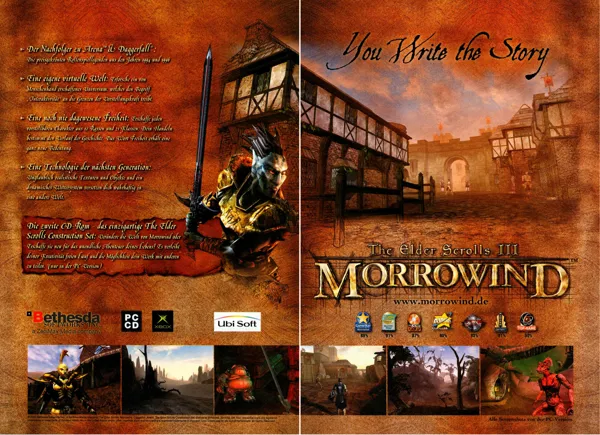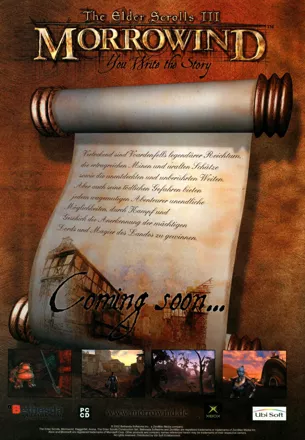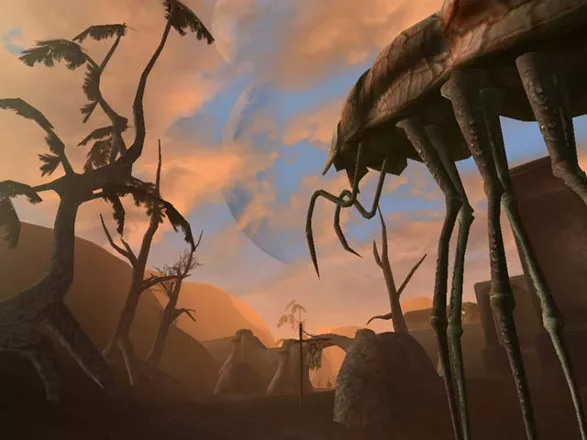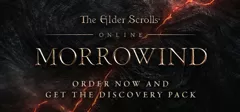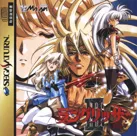The Elder Scrolls III: Morrowind
Description official descriptions
Freed by the decree of Uriel Septim VII, the Emperor of Tamriel, a lone prisoner is transported to the province of Morrowind. It seems that the strange dreams this prisoner has been having lately may have a connection to equally strange events occurring there. The protagonist is given a simple assignment: join the Blades, a secret organization whose goal is to protect the safety of the Emperor. This leads to a discovery of an ancient prophecy and an evil scheme concocted by a powerful deity whom the protagonist alone is able to stop.
Conceived in the tradition of the Elder Scrolls series, Morrowind is a fantasy role-playing game with a vast world open for exploration. After being released from a prison ship at the shores of the island Vvardenfell, the protagonist may do more or less what he or she wants: follow the main quest and solve the mystery of an ancient prophecy, join any of roughly a dozen guilds and rise in their hierarchy by performing duties, or simply explore the gigantic island with its stylistically diverse cities, hundreds of dungeons and tombs, ancient ruins and mighty fortresses.
Morrowind uses a two-stage skill system. The hero’s primary stats (strength etc.) increase with each level gained, while secondary abilities improve by use – for example, the more often the character jumps, the more proficient he or she becomes in the Acrobatics skill, etc. The action-oriented fights are simple exchanges of strikes or spells, until one combatant dies. The enemy's hit points and condition were not originally shown; however, at the request of customers a health bar was added for enemies as part of the first upgrade patch.
The protagonist's race and gender, but also his or her reputation influence the reactions of NPCs. If a character’s sympathy for the hero is low (rated on a scale from 1 to 100), he might refuse to answer questions; if it is high, the player will get more detailed information and better bargains in shops. Most quests involving other persons can be solved by persuasion, pick-pocketing, or simply by force.
The game's NDL 3D game engine is powerful in drawing wide, detailed outdoor landscapes as well as complex indoor environments. Transitions are not fluent; houses and dungeons must be loaded upon entering.
Spellings
- 上古卷轴III:晨风 - Simplified Chinese spelling
- 上古捲軸 III:魔捲晨風 - Traditional Chinese spelling
Groups +
- Animals: Cats
- Console Generation Exclusives: Xbox
- Covermount: Fullgames
- Elder Scrolls series
- Fantasy creatures: Dwarves
- Fantasy creatures: Elves
- Fantasy creatures: Orcs
- Gameplay feature: Alchemy
- Gameplay feature: Burden / Encumbrance
- Gameplay feature: Character development - Repetition
- Gameplay feature: Drowning
- Gameplay feature: Equipment quick slots
- Gameplay feature: Hunting
- Gameplay feature: Journal
- Gameplay feature: Paper doll inventory
- Middleware: Bink Video
- Middleware: Gamebryo / Lightspeed / NetImmerse
- PC Gamer Presents games
- Physical Bonus Content: World Map
- Protagonist: Female (option)
- Software Pyramide releases
- Technology: amBX
- Ubisoft eXclusive releases
- Xbox Classics releases
- Xbox Platinum Hits releases
Screenshots
Promos
Videos
Add Trailer or Gameplay Video +1 point
See any errors or missing info for this game?
You can submit a correction, contribute trivia, add to a game group, add a related site or alternate title.
Credits (Windows version)
118 People (80 developers, 38 thanks) · View all
| Project Leader | |
| Lead Designer | |
| Lead Programmer | |
| Lead XBox Programmer | |
| Lead Artist | |
| Lead Character Artist | |
| Programming | |
| Additional Programming | |
| World Art & Building | |
| [ full credits ] | |
Reviews
Critics
Average score: 89% (based on 83 ratings)
Players
Average score: 4.0 out of 5 (based on 285 ratings with 23 reviews)
If ambition equaled excitement, this would be tops. But it doesn't.
The Good
Let me start out by admitting that it's been several months since I played Morrowind. At first I thought that that would make my review a little suspect, but I've reached the conclusion that instead it might actually help people, since my remarks represent the impressions that have stuck with me over time.
First, the good. Morrowind is by far the most immersive RPG I've ever played. That's because it all takes place in first-person, in a convincingly rendered 3D world. Unlike most RPG's, which make you strain to convince yourself that you're actually the character on the screen, Morrowind lets you don the armor of your character of choice quite convincingly.
Hand in hand with that goes the fact that the art, the sounds, and the animations are all done nicely, and there are some genuinely interesting sights for you to see--at least for a few hours, until no matter what you see you'll have the distinct feeling that you've seen it all before.
Finally, the stats system is nice, with lots of areas for you to dump points into, and the freedom to shape your character as you'd like. Oh, and for the creatively inclined, the inclusion of a full-featured editor is a major boon--at least until your game gets so clogged up with crappy, doofus-grade mods that you swear off the use of them entirely.
The Bad
Ok. So much for the good. The bad: it's boring. Even though when you first start out, you'll be impressed by its seemingly limitless horizons, you'll soon realize that Morrowind is little more than yet another Federal Express simulator. The NPC's are flat and characterless, and there is absolutely no sense of life or activity in the countryside. Not a single butterfly or bird flits about in the sunshine. There is only lifeless landscape dotted with the occasional out-of-place looking "monster" (I put "monster" in quotes because none of them are particularly frightening). You'll be hard-pressed after a few days of repetitious slogging through Morrowind's environments to convince yourself that you're in anything like a realistic, living world.
Adding to this problem is the fact that Vvardenfell (the actual name of the island on which the game takes place) has got to be the most depressing place ever conceived. If Everquest is like crack, Morrowind is like Valium, and beyond one humorous main-quest NPC at the beginning of the game, there is nary a smile or bright moment to be had in the entire game. At least, there wasn't up to the point at which I finally had to quit playing before I just slit my wrists and ended it all. Every dark place is filled with evil and foreboding, but it's not exciting evil and foreboding, like, say, Mordor. It's dull evil and foreboding, like Cleveland, and somehow the designers have made even the bright, sunny areas of Vvardenfell seem merely like bright and sunny tombs full of nothingness.
As I said, the quests are boring. Even the main quest, which features one of those dime-a-dozen monumental revelations about your true nature so common to RPG's, lacks any ability to engage the intellect or imagination, and simply serves as one more excuse to send you hacking and slashing into yet another cave full of dark foreboding and evil. On the one hand you could ask, what does one expect from an RPG anyway? But on the other, you could ask with equal justice, why does the obvious and boring have to seem so doggone obvious and boring as it does in Morrowind?
The Bottom Line
Morrowind is a fun game for awhile, and is easily the most immersive RPG made to date. But it suffers from the somewhat serious defects of being boring and depressing. To be sure, it has legs among a certain segment of the population--those, I guess, who rather like boring and depressing games--but I imagine that for most people the interest in it will be relatively short-lived.
Windows · by Jim Newland (56) · 2002
Nearly as much freedom as real life
The Good
The greatest thing about Morrowind is that you can pretty much do anything you want. If you want to be a hero you can go off and kill some monsters and if you decide that you just want to walk around the continent picking mushrooms then you can do that as well. The stilt strider in my opinion was a great idea even though you never actually get to control it yourself. This game could take literally years to get bored of if you are a hardcore player and tryed to explore the whole map.
The towns and citys in Morrowind are beautifuly set out apart from one (Vivec) and you even have the choice of going in someones house, killing them and then taking the house for your own. There are also so many secrets that can be found and probably if you went around and looked in every hollowed out tree stump you could find a very powerful weapon.
The Bad
If you decide to travel by foot then you are going to be in for alot of frustration because when you are walking about every 5 minutes or so you get attacked by annoying creatures called Cliff racers. And even if you decide to be sneaky and swim to get away from the the Racers you will be attacked by Slaughter fish instead, so that usually takes most of the fun out of traveling by foot.
The only otherthing that really bugged me about Morrowind was that even on X-box there were alot of bugs and I could have been running across a bridge and then I would for some reason just fall straight through it. Though this did not happen very often.
The Bottom Line
A great game to buy and well worth the money you pay for it. You can probably get this game for about $40 now and thats not much to pay for the amount of entertainment you get out of this game. If you like Rpg's or you juts like freedom in a game then this game is more than worth taking a look at.
Xbox · by Horny-Bullant (49) · 2003
The Good
Daggerfall, the predecessor of Morrowind in the Elder Scrolls series, was a very ambitious game that captured the hearts and the minds of many hardcore role-players, at the same time "scaring away" those who were overwhelmed by the size of its world and its openness. Some people felt it was too big, with too much random design, both for locations and inhabitants.
Morrowind corrects that right away by offering us what is undeniably its most valuable asset - its world. The world is the star of the game, a goal in itself; and it is quite amazing. Without doubt, it is one of the most mesmerizingly beautiful and attractive worlds ever to grace a video game.
Of course, the technical quantum leap contributed to the quality of the game's environment. The vision of Daggerfall was still slightly ahead of its graphical capacities; in Morrowind, technology caught up with imagination. No more desolate, poor sprites decorating the landscape; no more pixelation and drab textures. Morrowind is significant as one of the visually most advanced role-playing games in history; not ever since the first Ultima Underworld have we seen an RPG that challenges first-person shooters in graphical prowess. Yes, the characters could have used some more work, but both in- and outdoor areas are beyond reproach, and the water is absolutely gorgeous. I honestly can't recall another game from that time and even a few years later with such beautifully rendered water.
This world, however, becomes much more memorable thanks to its artistic side, its strong personality and sense of style. The province of Morrowind is exotic: giant mushrooms cover the lairs of strange creatures; majestic urban architecture co-exists with the native dwellings of the dark elves; twisted mountain paths, dark caves, rivers glistening under the busy sky - the world of Morrowind is a marvel, and it is worth to play this game just for its exploration.
And this exploration, like in the previous Elder Scrolls games, is absolutely unrestricted. You can go wherever you want right from the beginning. The gigantic world (yes, much smaller than in Daggerfall, but still much bigger than in most other games) is open to you, and you are free to get to know it in any order, from any side you want. It has more charisma and mysterious charm than its predecessor, and a much more logical and coherent structure. I also liked the fact that you had to physically travel to towns rather than being magically transported to them through the world map. The freedom of movement is exhilarating; it's hard to play other games after Morrowind because they feel so limited in this aspect.
The world is also meticulously detailed, with people and objects everywhere; you can talk about thousands of things and get thousands of items. There is a huge amount of quests, several large factions to join, and so many different locations that you can easily complete the game while having seen only a small fraction of what it has to offer. This kind of generosity makes role-playing particularly rewarding: you are given the freedom to be what you want to be, unbound by moral constraints (except your own) and restricted accessibility to places and quests.
I think the series' trademark system of "practicing" skills is excellent. I love this steady, focused approach to leveling up, and I love the fact that with enough patience you can get overpowered. The whole point of role-playing is to start low and then reach tremendous heights. Morrowind brilliantly conveys this feeling. You start as a nobody, with a lousy weapon and no armor, easily killed by medium-sized creatures in the wilderness. But slowly, through exploration, questing, item-gathering, and not the least practicing, you can become a mighty, feared warrior who can take on Daedric lords and other assorted creatures of darkness. This process is extremely addictive, since there is hardly any limit to what you can discover and do in this game.
The main story may be less intriguing than in Daggerfall, but it nevertheless offers some interesting missions, and is generally enveloped in an aura of mystery that fits the gameplay very well. There is little urgency in the main quest, and it differs in its format from the usual "save the world" template. This goes well with the whole idea of "making your own story", building a biography for the protagonist by yourself rather than doing exactly what the designers told you to do.
The Bad
There is less randomness in Morrowind than in Daggerfall, but repetition and artificial widening of content is still evident. Yes, the world is populated by hundreds of NPCs with whom you can discuss various topics; but after a while, you begin to notice that these characters tell you the same stuff over and over again. There are no truly memorable characters in this world; 99% of the NPCs are signposts, drones devoid of personality and useful only for obtaining quest and basic info. You can try to conduct the conversation in such a way that you avoid the incessant "job description" dialogue ("I'm a thief. Thieves steal things and then sell them for profit. We also have a Guild, with branches located in the following cities... etc."), but then you may miss out some important info and will be left with pitiful one-sentence introductions that say nothing about what kind of person the character in question is. I still can't understand why the same writers who created all those wonderful books that can be found in the game world couldn't bother to write decent conversations.
The quests improve only slightly over the "I need you to kill a person. I will pay you 1437 gold pieces" of Daggerfall. With a few exceptions, the quests involve simplistic and repetitive tasks that offer no moral decisions, hence diminishing the game's value as an RPG. There is a lot of indifference in the people of Morrowind, and I couldn't help thinking sometimes that, in the long run, it didn't really matter what I did or did not in the game. The static, dry inhabitants of Morrowind form an unpleasant contrast with its beautiful art; it is as if someone put a curse on these people, making them apathetic and nearly lethargic, with intimidatingly robotic reactions to any crime the protagonist commits, and completely oblivious of anything else around them.
All this creates a feeling of emptiness, a certain coldness and loneliness that gradually creeps out and eventually takes over. Morrowind is a fascinating trip, but one that resembles an archaeological expedition more than a visit to a functioning, normal country. One may argue that this isolation is deliberate, intending to emphasize the complete freedom by eschewing any attachments to the characters; but that is a far-fetched theory. I'm sure that it was possible to populate the game's world by interesting people without harming its image as a "create your own story" experience.
The Bottom Line
Morrowind was the game that propelled its creators to stardom, and I think its success was fully deserved. We can complain all we want about its weak side quests and lack of interesting characters, but its majestic scope, its sensual beauty, and the exhilarating freedom of its gameplay are unparalleled. Forget about story, forget about goals: let yourself melt in the gigantic, strange world, and perhaps you will see how you slowly find yourself unable to leave it.
Windows · by Unicorn Lynx (181775) · 2014
Discussion
| Subject | By | Date |
|---|---|---|
| Add Game Group | karnak1 (22) | Dec 24, 2012 |
| Morrowind vs. Oblivion | Unicorn Lynx (181775) | Jul 26, 2007 |
Trivia
1001 Video Games
The Elder Scrolls III: Morrowind appears in the book 1001 Video Games You Must Play Before You Die by General Editor Tony Mott.
Content
Morrowind is told to include 3244 NPCs, 316.042 hand placed objects, 480 billion possible characters to create and play, 150 billion spells by using spellmaking in the game, and six full sized novels worth of text.
Creature differences
Some monsters and creatures went through drastic visual changes from Daggerfall and Battlespire to Morrowind. First, the type of khajiit are the same as those presented in Redguard, while the Dremora were turned from fair-skinned, horned demons to black and red-skinned demons. Harpies were replaced with (visually at least) Winged Twilights, and other monsters such as the slaughterfish, orcs and others remain much the same, though much better looking in true 3D.
Graphics
Ever wonder why Morrowind can run at such a slow FPS sometimes and why the game is notorious for making even expensive, fast systems (as of 2004) seem slow? The answer is simple; polygons. While playing the game you'll encounter vast areas full of people, objects and architecture. All these are made from polygons and require the videocard to process them. Morrowind has possibly the heaviest counts of polygons in a single video game, most likely surpassing every game before it and still with a vast number more than contemporary games.
References
There is a single daedric crescent from Battlespire hidden in Morrowind, but getting to it requires some work and initiative (it isn't a part of any main or faction quest), or access to a hint guide.
Awards
- 4Players
- 2002 – #9 Best PC Game of the Year (Readers' Vote)
- Computer Games Magazine
- March 2003 (Issue #148) - #3 overall in the "10 Best Games of 2002" list
- Computer Gaming World
- April 2003 (Issue #225) – RPG of the Year
- GameSpy
- 2002 - PC RPG of the Year
- 2011 – #14 Top PC Game of the 2000s
- RPG Vault
- 2002 - Game of the Year
- 2002 - Role-Playing Game of the Year
Information also contributed by calavera, Jason Musgrave, ShadowStrike and WildKard
Analytics
Upgrade to MobyPro to view research rankings!
Related Sites +
-
Baldurdash
Kevin Dorner's site has bug fixes for Morrowind -
Elder Scrolls III: Morrowind
The official homepage of Elder Scrolls III: Morrowind. Contains general information, downloads, art, and plug-ins. -
Hints for Morrowind
Need just a few clues about Morrowind? These question and answer hints provide nudges before the final solutions are revealed. -
Morroblivion
A free mod that brings Morrowind into Oblivion by converting the game files. -
Morrowind Summit
A Morrowind fan site containing vast amounts of information about the land of Morrowind and how to create your own Morrowind adventures. -
Morrowind at RPGDot
Contains news, information, and downloads for Elder Scrolls III: Morrowind. -
Telesphoros' List o' Mods
One man's opinion of the ESSENTIAL fan-made enhancements (mods) to the Morrowind world. -
The Elder Scrolls III: Morrowind - FAQs & Guides
A multitude of walkthroughs, faqs, maps, text files on Morrowind. -
Wikipedia: The Elder Scrolls III: Morrowind
Article about the game in the open encyclopedia -
Wiwiland
French modding community with a lot of exclusive mods.
Identifiers +
Contribute
Are you familiar with this game? Help document and preserve this entry in video game history! If your contribution is approved, you will earn points and be credited as a contributor.
Contributors to this Entry
Game added by NeoMoose.
Xbox One added by Kennyannydenny. Xbox Cloud Gaming added by Sciere.
Additional contributors: PCGamer77, -Chris, Unicorn Lynx, Jeanne, OFoglada, Shoddyan, Sciere, Aubustou, Paulus18950, Patrick Bregger, FatherJack, Kennyannydenny.
Game added May 10, 2002. Last modified April 19, 2024.
